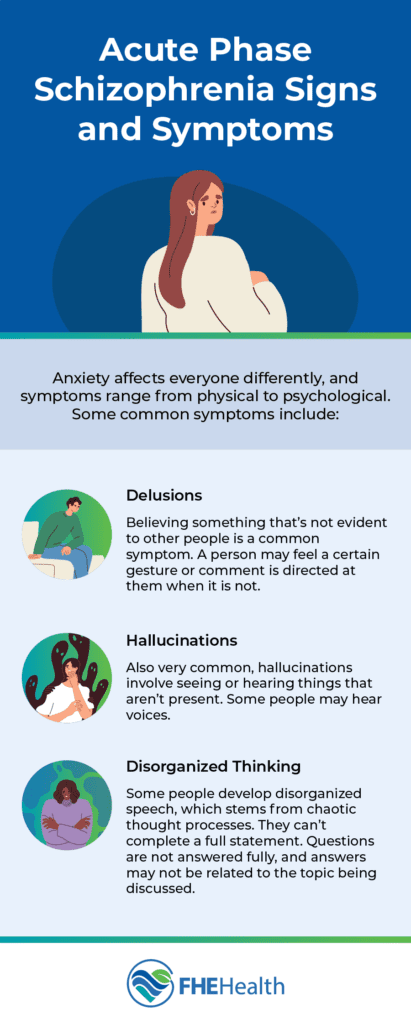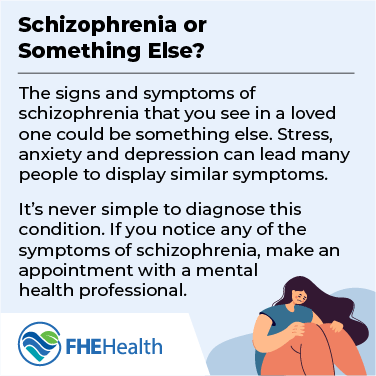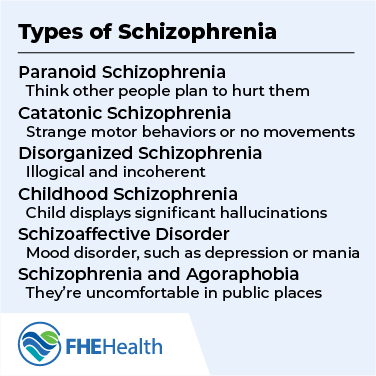Schizophrenia is a very specific mental health disorder characterized by a handful of signs and symptoms. It’s not always easy to know if you are schizophrenic or if a loved one may have some of these traits. There are numerous signs of this condition, mainly because there are many types of schizophrenia.
The Effects of Schizophrenia and How They Begin to Manifest
Though schizophrenia is a less common mental health disease, many people believe they know what it is and what the signs are, mainly due to its popularization in movies and TV. Yet, what you perceive as common schizophrenia traits isn’t necessarily accurate.
Though this is a life-long condition, it’s typically difficult to diagnose, often meaning that most people who have it have no idea. They don’t know they’re facing mental health challenges, don’t seek out care and don’t receive an early diagnosis. Often, it isn’t diagnosed until it begins to affect day-to-day life.
Understanding Prodrome
Prodromal syndrome or prodrome is the initial phase of schizophrenia. Prodromal, or beginning phase symptoms are important to recognize for early treatment but often the most difficult to pinpoint. They indicate the onset of mental illness.
For example, a person who develops measles will not initially have red dots on their skin. Rather, the initial signs are a fever. The same applies to the early symptoms of schizophrenia. These prodromal symptoms can indicate the beginning of the mental illness if a doctor can connect the dots.
These early warning signs of schizophrenia in adults may consist of small changes in the way a person feels or thinks. Most often, this change includes a slow progression of perception changes. They feel differently about things, begin to pull away from situations and may become irritable.
They have trouble concentrating or remembering things, even though this has never been a problem previously. Additionally, they may begin to have difficulty with studying or focusing on tasks at work. This generally happens at such a slow process that it’s hard to pinpoint.
These schizophrenia traits very commonly develop in males 18 to 25 and females 25 to 35. These signs of schizophrenia don’t begin for any specific reason. There isn’t always a catalyst that creates the change. They’ve typically always been there but are becoming more impactful in day-to-day life at this point.
Acute Phase Schizophrenia Signs and Symptoms
 These early symptoms of schizophrenia may become more intense as the condition progresses, especially if left untreated. The acute phase consists of very specific and clear psychotic symptoms. In this phase, the signs of schizophrenia are more likely to include the following:
These early symptoms of schizophrenia may become more intense as the condition progresses, especially if left untreated. The acute phase consists of very specific and clear psychotic symptoms. In this phase, the signs of schizophrenia are more likely to include the following:
- Delusions: Believing something that’s not evident to other people is a common symptom. A person may feel a certain gesture or comment is directed at them when it is not. They may also believe they’re being harassed or harmed in some way when other people would not believe this. Nearly all people with schizophrenia have delusions of some sort.
- Hallucinations: Another very common schizophrenia symptom is hallucinations, which involve seeing or hearing things that aren’t present. Some people may hear voices. Others may feel someone is standing in the room, even though there’s no one. While everyone can experience feelings of someone watching them, for those with signs of schizophrenia, it’s very real and impacts their normal experiences.
- Disorganized thinking: Some people develop disorganized speech, which stems from chaotic thought processes. They can’t complete a full statement. Questions are not answered fully, and answers may not be related to the topic being discussed.
As the condition advances, many people develop more obvious schizophrenia symptoms, including very disorganized motor behavior, such as acting childlike or unpredictable. Many have abnormal motor behavior as well, such as abnormal posture, lack of any response, excessive movements and useless movements.
They also may not function normally at the most severe level. This includes lacking personal hygiene or being unable to convey emotions properly.
Spotting the Signs of Schizophrenia in Others
If you believe someone you know or live with has schizophrenia symptoms, it’s best to notice first the progression of change in thoughts and behaviors. Have they begun to change their thought patterns to question things more often? Many people won’t have delusions and hallucinations at first; rather, they seem to be “different” than they used to be without any evidence of a significant event that could have changed their attitude.
You may notice that they:
- Feel threatened by simple things or often say they’re being attacked verbally
- Make statements that the TV is talking to them or that people are sending thoughts to them
- Claim to hear other peoples’ thoughts
- Having delusions of grandeur are also common, often feeling they’re superior to others for no real reason
- State other people are trying to steal their thoughts
- Use the wrong words in sentences or jumble words around
- Believe they can make things happen through their thoughts
- Repeat statements or words numerous times
- Pace repeatedly
- Hold a motionless and rigid posture for a long time
Sometimes, these changes involve having a lack of energy, interest in life or any type of social skills. They simply don’t have any interest in making or keeping friends. The key here is to watch the potential schizophrenia symptoms develop over a period of time, whether it’s years or months.
Could You Be Seeing Signs of Something Else?
 It’s always possible that the signs and symptoms of schizophrenia that you see in a loved one could be something else. Stress, anxiety and depression can lead many people to display mentally taxing symptoms such as these.
It’s always possible that the signs and symptoms of schizophrenia that you see in a loved one could be something else. Stress, anxiety and depression can lead many people to display mentally taxing symptoms such as these.
It’s never simple to diagnose this condition. If you notice any of these symptoms, there is something wrong, and an appointment with a mental health professional is typically necessary.
Different Types of Schizophrenia and Their Signs
To further complicate the symptoms, you may see that there are a number of different types of schizophrenia. These are a few with their typical signs:
 Paranoid schizophrenia: A person with this type often believes that other people (whether a group or an individual) plan to hurt them. You may see them take steps to try to protect themselves from others as a result.
Paranoid schizophrenia: A person with this type often believes that other people (whether a group or an individual) plan to hurt them. You may see them take steps to try to protect themselves from others as a result.- Catatonic schizophrenia: In this form, a person may have strange motor behaviors that occur at a very unpredictable rate, or they may have nearly no movements at all. They stop talking, for example.
- Disorganized schizophrenia: A person with this form may be illogical and incoherent. They may have strange patterns of speech or cannot organize their thought patterns. Speech patterns are so odd that they’re hard for another person to understand.
- Childhood schizophrenia: This is a very rare condition, but it can occur when a child displays significant hallucinations about friends or threats in their daily life that aren’t there. Many are delusional and unable to communicate effectively.
- Schizoaffective disorder: Those who have this disorder also have a mood disorder, such as depression or mania. Most often, they begin displaying mania or depression alongside any other symptoms.
- Schizophrenia and agoraphobia: In some cases, individuals can develop either agoraphobia or panic disorder along with schizophrenic symptoms. That may mean they’re uncomfortable in public places or don’t feel safe in these environments.
Diagnosis Schizophrenia
Diagnosing schizophrenia requires a comprehensive look at all symptoms and overall health factors to determine what specific type of mental illness is present. This generally begins with a physical exam and screenings such as an MRI and CT scan to rule out conditions such as alcohol and drug dependency or physical disease. Doctors provide a full psychiatric evaluation, including discussing symptoms, how often they’re present and how much they impact daily life.
This condition can’t be self-diagnosed. Simply, a person with schizophrenia symptoms can’t see through them to recognize they may have a mental illness. For that reason, only a professional diagnosis is possible in nearly all situations.
Get Help for Schizophrenia Today
If you or a loved one is experiencing symptoms of schizophrenia, it’s crucial to seek professional help. Contact us today to learn more about our comprehensive mental health services and how FHE Health can support you on the path to recovery.








